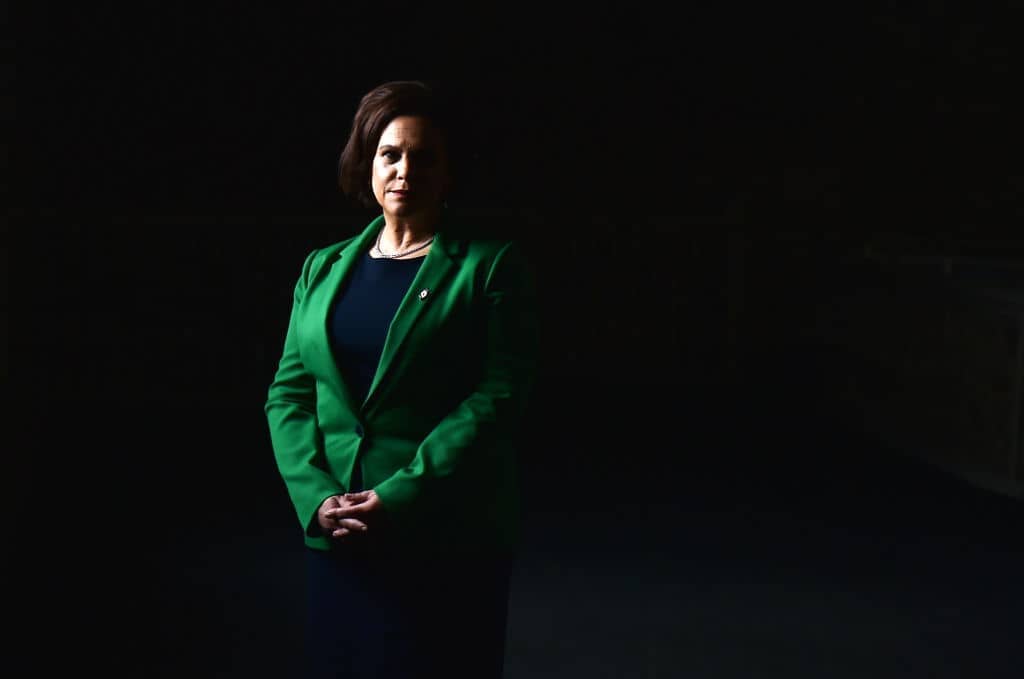The possibility of a political wing of a terrorist organisation becoming a party of government in an EU member state would normally be headline news. But that’s precisely what’s happening in Ireland.
Sinn Fein is currently enjoying a consistent lead at the top of the polls in the Republic; a recent example from the Irish edition of the Sunday Times shows it had surged by six points to 37 per cent, some distance ahead of Fine Gael and Fianna Fail, currently coalition partners. Public approval of the Sinn Fein leader Mary Lou McDonald — the middle-class Dubliner who described the IRA campaign as ‘justified’ and mused that there was ‘every chance’ she would have joined in if she had the chance — is at 50 per cent. The current Taoiseach, Michael Martin, is nine points behind her.
The nuances of the Republic’s electoral system and the strength of anti-Sinn Fein feeling among other parties could in all likelihood lead to another coalition designed to keep them out of government. The aftermath of the 2020 election is an instructive example. Yet the consistent and increasing popularity of a party of terrorist sympathisers holds up an unforgiving mirror to the state of society in the Republic which often goes unrecognised — deliberately or otherwise — by elements of the UK’s political class.
There is now a strong chance that it will become the largest party at Stormont following next year’s election
Events in the south are not taking place in isolation though. Such is Sinn Fein’s stranglehold on nationalist politics in Northern Ireland — and the atomisation of the unionist vote — that there is now a strong chance it will become the largest party at Stormont following next year’s election.
A strategic slip-up by the DUP — in 2006, they pushed through a change which meant that the leader of the largest party, rather than the party at the head of the largest designation in the Assembly would become first minister — means that Michelle O’Neill would take that role on, based on current projections. Recent polling has Sinn Fein on 24 per cent, six ahead of their nearest challengers, the DUP.
It would be churlish to underplay the symbolic significance of this pincer movement; a Sinn Fein first minister in Belfast a year after Northern Ireland’s centenary would be a bitter blow for unionism. If that was allied to Sinn Fein becoming part of the government in the Republic, chatter around a border poll would ramp up considerably, not to mention the institutions of government in Dublin being weaponised towards achieving it.
Already there is a cottage industry that promotes the idea that because of Brexit, the improved electoral fortunes of nationalism and the relentless march of demographic change, that unionism should pack it in and enter into a conversation about what this ‘New Ireland’ should look like.
Unionism, already prone to introspective bouts of doom and gloom, could conceivably talk itself down the road towards Dublin. There are plenty of figures in Northern Ireland who will be willing them on to do just that, more to fulfil their own preconceived dogmas and notions.
However, despite Sinn Fein and Irish nationalists’ belief in that article of faith that reunification is around the corner, the polling on the situation in Northern Ireland — arguably more important than any polling on the state of the parties in the Dail — is consistently in favour of the Union.
In recent months, a poll for the University of Liverpool’s Institute of Irish Studies found 58.6 per cent would vote for the Union were a poll held tomorrow, while the Northern Ireland Life and Times Survey showed that only a third would do the same for a United Ireland. It would be a mistake then to think of a correlation between the realignment in unionist party affiliation — largely voters ditching the DUP for elsewhere — as a sign of the Union’s weakness.
Instead of being willed into what would be a trite, one-sided conversation about a ‘New Ireland’, unionists should ignore the noise and instead take stock themselves on how they further secure Northern Ireland’s place within the United Kingdom. The polling shows the sizeable persistence of an undecided or non-aligned column who, if convinced about the merits of the Union, will provide it with considerable ballast.
For over a century, Irish nationalists and their fellow travellers have predicted the imminent demise of Northern Ireland and its absorption into the Republic. It may well happen, but it need not be inevitable. Rather than worry about whether Sinn Fein will get access to a ministerial car as opposed to plotting to blow them up, unionists should start to focus on promoting the wide-ranging arguments in their favour.






Comments